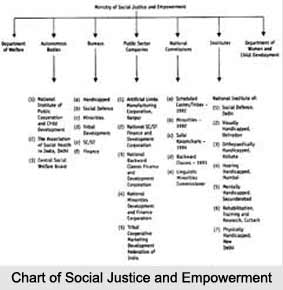 Ministry of Social Justice and Empowerment is responsible for the social upliftment and welfare of the disadvantaged sections of society. In the year 1985-86, the erstwhile Ministry of Welfare was bifurcated into the Department of Women and Child Development and the Department of Welfare. Simultaneously, the Scheduled Castes Development Division, Tribal Development Division and the Minorities and Backward Classes Welfare Division were moved from the Ministry of Home Affairs and also the Wakf Division from the Ministry of Law to form the then Ministry of Welfare. Subsequently, the name of the Ministry was changed to the Ministry of Social Justice and Empowerment in May, 1998. Further, in October, 1999, the Tribal Development Division had moved out to form a separate Ministry of Tribal Affairs. In January, 2007, the Minorities Division along with Wakf Unit have been moved out of the Ministry and formed as a separate Ministry and the Child. The Development Division has gone to the Ministry of Women and Child
Ministry of Social Justice and Empowerment is responsible for the social upliftment and welfare of the disadvantaged sections of society. In the year 1985-86, the erstwhile Ministry of Welfare was bifurcated into the Department of Women and Child Development and the Department of Welfare. Simultaneously, the Scheduled Castes Development Division, Tribal Development Division and the Minorities and Backward Classes Welfare Division were moved from the Ministry of Home Affairs and also the Wakf Division from the Ministry of Law to form the then Ministry of Welfare. Subsequently, the name of the Ministry was changed to the Ministry of Social Justice and Empowerment in May, 1998. Further, in October, 1999, the Tribal Development Division had moved out to form a separate Ministry of Tribal Affairs. In January, 2007, the Minorities Division along with Wakf Unit have been moved out of the Ministry and formed as a separate Ministry and the Child. The Development Division has gone to the Ministry of Women and Child
Functions of Ministry of Social Justice and Empowerment
Operation of Indo-US, Indo-UK, Indo-German, Indo-Swiss and Indo-Swedish Agreements for duty free receipt of donated relief supplies/goods and matters connected with the distribution of supplies coming thereunder; social security and Social Insurance save to the extent allotted to any other Department; Relief of the disabled and unemployable and measures relating to social security and social Insurance, save to the extent allotted to any other Department. The Ministry is further responsible for Social Welfare: Social Welfare Planning, Project formulation, research, evaluation, statistics and training; Conventions with other countries in matters relating to social defence and references from United Nations Organisation relating to prevention of crime and treatment of offenders; Education, training, rehabilitation and welfare of the physically and mentally handicapped; National Institute for the Physically Handicapped and Mentally Retarded; Rehabilitation of the persons with disabilities and rehabilitation of the mentally ill; National Centre for the Blind including the Central Braille Press, Dehradun, Training Centre for the Adult Deaf, and School for the partially deaf children, Hyderabad; Model School for Mentally Retarded Children, New Delhi and other national institutes` Social and Moral Hygiene Programme; Research, evaluation, training, exchange of information and technical guidance on all social defence matters; All matters relating to alcoholism and substance (drug) abuse and rehabilitation of addicts/families; Promotion of efforts including voluntary efforts to ensure the well being of the older persons; All matters relating to prohibition; Educational and social welfare aspects of drug addiction; Charitable and religious endowments pertaining to subjects allocated to this Ministry; Promotion and development of voluntary effort on subjects allocated to this Department; National Institute of Social Defence; Institute for the Physically Handicapped, New Delhi; National Institute for the Orthopaedically Handicapped, Kolkata; National Institute of Rehabilitation, Training and Research, Cuttack; National Institute for the Mentally Handicapped, Secunderabad; Ali Yavar Jung National Institute for the Hearing Handicapped, Mumbai; National Institute for the Visually Handicapped, Dehradun; National Handicapped Finance and Development Corporation, Faridabad; Artificial Limbs Manufacturing Corporation of India, Kanpur; The Rehabilitation Council of India Act, 1992 (34 of 1992) and Rehabilitation Council constituted there under; The Persons with Disabilities (Equal Opportunities, Protection of Rights and Full Participation) Act, 1995 (01 of 1996); The National Trust for Welfare of Persons with Autism, Cerebral Palsy, Mental Retardation and Multiple Disabilities Act, 1999 (44 of 1999); Chief Commissioner for Disabilities; Scheduled Castes and other Backward Classes including scholarships to students belonging to such Castes and Classes; National Commission for Scheduled Castes; Development of Scheduled Castes and other Backward Classes.
The Ministry of Social Justice and Empowerment is the nodal Ministry for overall policy, planning and coordination of programmes of development of Scheduled Castes and Other Backward Classes. In regard to sectoral programmes and schemes of development pertaining to these communities, policy, planning, monitoring, evaluation etc. as also their coordination will be the responsibility of the concerned Central Ministries, State Governments and Union Territory Administrations. Each Central Ministry and Department will be the nodal Ministry or Department concerning its sector.






